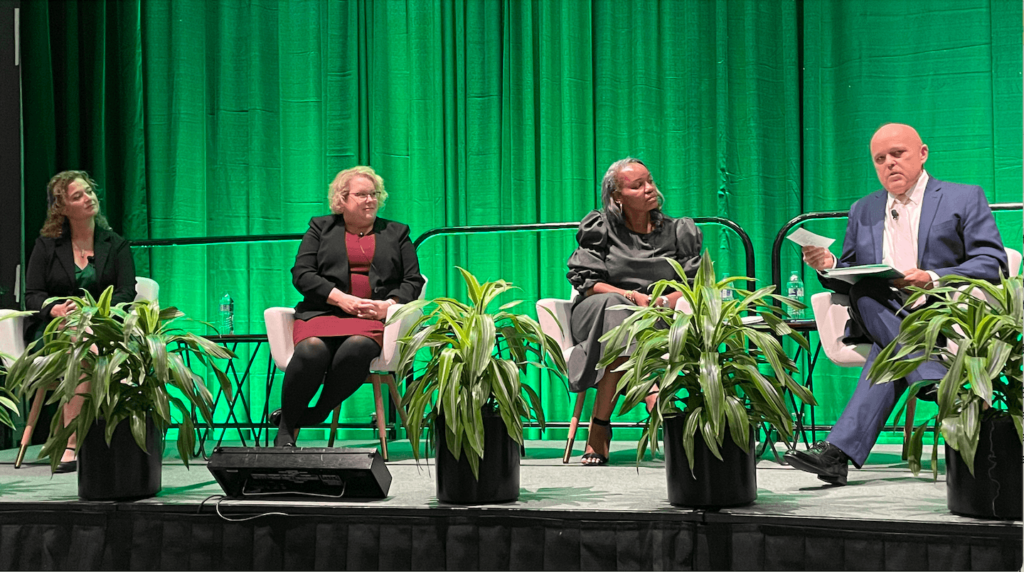
DENVER—Assisted living is a “very important” part of the care continuum and isn’t going away, but one area of focus for the future, even among private-pay operators, should be population health management, National Center for Assisted Living Executive Director LaShuan Bethea said Sunday.
“Value-based care is another way to look at population health management, and it’s more focused on the Medicare beneficiary,” she explained during a panel discussion about the future of assisted living that capped off NCAL Day.
Bethea shared that more than 50% of assisted living residents who are Medicare beneficiaries are covered by a Medicare Advantage plan, and the percentage is growing. Another 20% of residents receive care as part of an accountable care organization, she said.
“Together, that makes over 70% of individuals that are in our buildings … in some type of accountable care relationship,” Bethea said. “We are going to start to see external entities look to us to play a part in what that value-based care looks like, and so it is ultimately going to have some impact on how we operate.”
Assisted living can play a “big role” in population health management, Bethea said, “because we play a key role in the value, in the cost savings that many of those Medicare Advantage and ACO plans experience.”
Data part of continuous improvement
Data collection and analysis is what will tell operators that what they are doing everyday is meeting the needs of residents, said panelist Pam Truscott, DNP/HSL, MSN/ED, RN, NCAL director of quality improvement.
Capturing data should be part of the long-term care continuous improvement process, she said. And for providers worried that the data they collect could be used by authorities to regulate the industry, she said, “Even if your regulators captured that data, they’re going to question, ‘What are you doing with that data?’…If you can show the actions that you’re taking … to improve that area, then you’re already answering their question. The key is, do something with that data.”
Bethea added that there is no federal database to which assisted living providers submit data on aspects of the setting, because assisted living is not regulated in the same way as skilled nursing or hospitals. But she said that state regulation of assisted living is occurring at a rate she hasn’t seen in her more than 20 years in the long-term care industry.
“The bottom line is, the federal government has access to data on assisted living that we right now don’t have access to,” she said, referring to Medicare claims data.
“Do not be afraid of the data, because let me tell you what will happen when we don’t have the data. Decisions will be made about what we do in assisted living, because they will be using data to make their decisions, and we have nothing to push back on it,” Bethea said. “We need to start collecting our data so we can make performance improvement based on what we’re seeing. And guess what? That gives us a powerful tool to be able to push back on it.”
Affordable assisted living
Affordable assisted living also is “a hugely needed area of service,” Bethea said.
“That’s the direction that more and more of us need to go,” panelist and NCAL Board Chair Gerald Hamilton said.
Bethea said that interested providers can look to reduce their overhead costs via loans or grants to be able to offer lower rates to some people. She also encouraged attendees in applicable states to start advocating for increased Medicaid reimbursements for the growing number of “financially insecure” older adults who are on the cusp of needing senior living services.
Regulation increasing
In the past three years, 33 states have enacted assisted living regulatory changes, according to panelist Jill Schewe, NCAL director of policy and regulatory affairs. Most of those changes, she said, were overhauls of licensing, specifically related to memory care. Other regulation targets, she added, include infection control and resident rights, disclosures and contracts.
“Our goal is to keep assisted living regulated at the state level,” Schewe said, acknowledging that providers are regulated to some extent at the federal level already through agencies such as the Department of Labor, the Occupational Safety and Health Administration and, for providers of home- and community-based services, the Centers for Medicare & Medicaid Services.
One of the assets that assisted living providers have is the ability to advocate, Bethea said. Now more than ever, she added, it is important for providers to foster relationships with legislators and regulators and to provide community tours so that they understand the nuances of the sector versus other types of settings and how their decisions will affect residents and caregivers in assisted living buildings. The upside to the sector, she said, is that legislators and regulators will view operators they know as resources when they have questions.
NCAL said that a record 258 attendees attended the 17th annual NCAL Day. Delivering Solutions 23, the American Health Care Association / NCAL’s annual convention, gets underway fully today and ends Wednesday.

